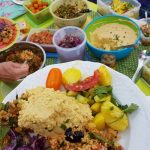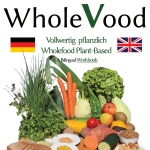Here you can read and sign the German version of the petition:
https://innn.it/EU-Schulprogramm-WholeVood-statt-Schulmilch
Our petition in the following version was registered by the European Parliament on 28.7.2022 under the number 0704/2022. As soon as the Committee on Petitions has taken a decision on admissibility, a summary in all EU languages will be published on the petition portal and can then additionally be supported there: https://www.europarl.europa.eu/petitions/en/home
EU school scheme: Redirect all EU funding for school milk in favour of Whole Food Plant-Based Nutrition (WFPBN) for our pupils
This year, as usual, the EU is subsidising school milk to the tune of about €95 million. This amount is not invested in the sense of the declared goals (see below). In contrast, a Whole Food Plant-Based Nutrition (WFPBN, or WholeVood as we call it) is sustainable in production and lays the foundation for the healthy development of our schoolchildren.
The consultation on the “Review of the EU school fruit, vegetables and milk scheme” is open until 28 July 2022. We very much appreciate both the possibility for EU citizens to participate via questionnaires (2) and most of the underlying objectives of these EU measures. However, we consider the inclusion of dairy products in this scheme to be absolutely wrong, but could not express this conviction in the survey. We have therefore chosen the petition route to express what we see as an urgent and important concern. In the following, we explain why subsidising school milk is not goal-oriented.
EU funding in the school year 2022/2023:
Final allocation for school fruit and vegetables: €125.7 million. Final allocation for school milk: €95.1 million. (3) Objectives and measures of the EU school scheme:
To increase the consumption of fruit and vegetables (unfortunately also milk, we call for this to be corrected), to reduce the consumption of processed foods high in sugar, salt, fat or additives, to prevent obesity and to guide children towards a healthy diet and lifestyle. (4) Cause for consultation on the EU school scheme:
For 2023-2027: improving sustainability and consumption, promoting healthy diets against cancer. (5) Our rationale for allocating the entire budget of approximately EUR 220 million per year to the promotion of whole food plant-based diets:
It is the direct way to achieve the goals formulated in this project. The EAT-Lancet Commission states that “[…] a diet rich in plant-based foods and with fewer animal source foods confers both health and environmental benefits. […]” (6) Redirecting the funding currently used for school milk to promote the consumption of organically grown vegetables, fruits, whole grains, nuts and seeds will correspondingly increase the benefits of the project for our school children.
Our reasons for ending the distribution of dairy products to school children:
The production of dairy products is an avoidable burden on our environment and climate. When comparing cow’s milk with plant milk, for example, oat milk contributes only 8% to ocean acidification, land use is only 21%, greenhouse gas emissions are only 31% and energy consumption is only 39%. (7) The currently raging forest fires and the war between Russia and Ukraine further aggravate the CO 2 situation in Europe. A readjustment of measures to achieve our climate goals is urgently needed. Financing school milk from tax revenues also for the coming 5-year cycle would be counterproductive and the wrong signal for the economy. Reducing the climate impact of milk production by removing subsidies in favour of promoting sustainable plantbased products is appropriate now, and a high level of acceptance (8) of these measures among the population can be expected.
While WFPBN may have a preventive effect against the development of cancer, dairy products are even discussed as a possible cause of cancer.
Introducing children to a healthy diet also means getting them used to drinking water. Milk is less suitable as a thirst quencher. If it contains added sugar, which is allowed on request under current regulations, it can contribute to the development of obesity.
Cow’s milk, produced by a 300 kg mammal due to its pregnancy, naturally contains hormones designed for the rapid growth of its own calves. It is possible that the consumption of this (organic) milk influences the development of our children in a way that is neither intended nor beneficial to health. High levels of oestrogen and progesterone may be involved in the development of acne, breast and ovarian cancer and early sexual maturity. The insulin-like growth factor IGF-1, which is about 6-fold higher in cow’s milk than in human breast milk, possibly triggers faster growth in the size of children and may promote cancer development.
Organic plant products are consistently uncontaminated, but dairy products may be polluted with pesticides, medicines, multi-resistant germs and pus residues.
Some children live on a purely plant-based diet, and a steadily growing number of children cannot tolerate dairy products due to lactose intolerance. Therefore, not all children can benefit equally from school milk financed with tax money.
From a recent youth survey, explained in the Meat Atlas 2021: “What unites this generation is the rejection of the current form of animal husbandry. […] Young people see the state as having a (co-)responsibility for a sustainable diet.” (8) We request that the EU school scheme already in the coming 5-year cycle be exclusively geared towards promoting the consumption of organically grown vegetables, fruit, whole grains, nuts and seeds in the sense of Whole Food Plant-based Nutrition (WFPBN), excluding any cow’s milk products.
Thank you for your continued support.
Detlev Göpel, WholeVood Author of “WholeVood” (1) Leader of WholeVood.Pod Berlin (9) Certified nutritionist (ecodemy.de, nutritionstudies.org)
(1) WholeVood, A bilingual workbook, Detlev Göpel, tredition.com, 2022 https://www.wholevood.com/wholevood-the-book/
(2) Consultation on the “Review of the EU school fruit, vegetable and milk scheme” https://ec.europa.eu/eusurvey/runner/School_Scheme?surveylanguage=en
(3) COMMISSION IMPLEMENTING DECISION (EU) 2022/1187 of 7 July 2022: https://eur-lex.europa.eu/legal-content/EN/TXT/PDF/?uri=CELEX:32022D1187&from=EN
(4) School scheme explained: https://ec.europa.eu/info/food-farming-fisheries/key-policies/common-agricultural-policy/market-measures/school-fruitvegetables-and-milk-scheme/school-scheme-explained_en
(5) Review of the EU school fruit, vegetables and milk scheme, https://ec.europa.eu/info/law/better-regulation/have-yoursay/initiatives/12970-Review-of-the-EU-school-fruit-vegetables-and-milk-scheme/public-consultation_en
(6) EAT (2019): Summary Report of the EAT-Lancet Commission on Healthy Diets From Sustainable Food Systems, p. 3, 5. Available at https://eatforum.org/eat-lancet-commission/eat-lancet-commission-summary-report/
(7) Albert Schweitzer Stiftung für unsere Mitwelt (2018): On the life cycle assessment of plant milk: https://albert-schweitzer-stiftung.de/aktuell/oekobilanz-pflanzenmilch
(8) Heinrich Böll Foundation, BUND, LE MONDE diplomatique (2021): Fleischatlas 2021: https://www.boell.de/de/de/fleischatlas2021-jugend-klima-ernaehrung?dimension1=ds_fleischatlas_2021
(9) WholeVood.Pod Berlin, Germany https://www.wholevood.de/pod/ Our Pod is part of the PlantPure Communities https://plantpurecommunities.org
(Version 1.0)



